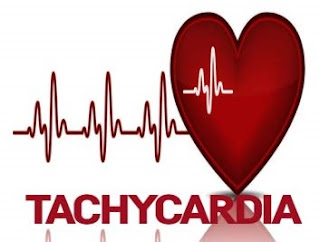Tachycardia during Anesthesia
Definition:
-Pulse rate greater than 100 beats/min. in adults
Causes and Management:
1-Light anesthesia, Pain:
-Hypertension, sweating, lacrimation, reactive pupils, movement
Treatment: Deepening the anesthesia, Analgesia
2-Drug induced:
-Anticholinergic drugs, Catecholamines, Oxytocin
3-Hypovolemia:
-Actual (due to fluid loss):
Treatment: Fluid replacement
-Effective (due to vasodilatation):
Treatment: Vasopressors (α-agonists, Ephedrine)
4-Hypercarbia:
Treatment: Check soda lime, Increase minute ventilation, and Exclude malignant hyperthermia
5-Hypoxia:
The initial response is tachycardia
Treatment: Of the cause
6-Cardiac dysrhythmia:
-SVT:
Treatment: Of the cause, Carotid sinus massage, Adenosine, Verapamil, Amiodarone, Digoxin
-VT:
Treatment: Of the cause, Lidocaine, Amiodarone, Synchronized DC (if sustained or hemodynamically unstable)
7-Endocrine disease:
-Pheochromocytoma, Thyrotoxic crisis
Treatment: α-blockers, β-blockers
8-Sepsis:
9-Malignant hyperthermia:
The first sign is tachycardia
Treatment: According to management guidelines

























